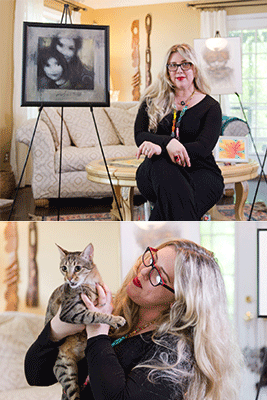Dr. Autumn Cockrell-Abdullah Discusses Art, Conflict, and Iraqi Kurdistan

KENNESAW, Ga. (Sep 13, 2018) — Note: Dr. Autumn Cockrell-Abdullah has a MA in Anthropology and was a long-time part time faculty member in our department. She worked with Dr. Debarati Sen on her PhD research. She highlights the way that anthropology scholars can do interdisciplinary research in a program such as the PhD in International Conflict Management. This story originally appeared in KSU News on May 7, 2018.
Autumn Cockrell-Abdullah says jokingly that one of the best outcomes of her year working and doing research in Northern Iraq — known as Kurdistan — is the street cat she rescued on a Halloween night, named Boo, and brought home to live with her in the U.S.
Some of her colleagues and professors in the Ph.D. in International Conflict Management program, from which she will graduate on May 8, might disagree. Some have suggested that the research Cockrell-Abdullah conducted for her dissertation, titled “Art & Agency: Transforming Relationships of Power in Iraqi Kurdistan,” contributes new scholarship and understanding of Kurdish identity through art and culture in the face of the region’s long, complex history of conflict.
“Despite the Kurds’ role in some of the most critical conflicts in the Middle East, even today in the fight against ISIS,” Cockrell-Abdullah says, “most of the world lacks an understanding of the complex, multi-layered cultural impacts of the socio-political factors inside Iraqi Kurdistan.”
Violent conflicts in Northern Iraq like the Anfal campaign near the end of the Iran-Iraq War in 1988 and the 1991 uprisings against Saddam Hussein’s regime led to tens of thousands of Kurds being killed and more than two million displaced. In the wake of those conflicts, Cockrell-Abdullah’s research seeks to use art to expose and examine what she says is “a bubbling pot of social issues that lies just underneath the skin of inter-Kurdish tensions.”
In four visits to the region from 2013 to 2017, she has discovered voices among contemporary visual and conceptual art and artists that point towards cultural and structural forms of violence within Kurdish society that could create conflict. They are voices not reflected in what Cockrell-Abdullah calls “the deeply entrenched political rhetoric of a nationalist narrative.”
Her research also examines the place of culture in conflict and conflict analysis, and how meaning is made and translated into ideas and behavior, potentially producing moments of conflict.
"Autumn’s dissertation is a good demonstration of what visual arts reveals about conflict – more specifically about the struggles of a minority group like the Iraqi Kurds in a post-conflict period," said Debarati Sen, associate professor of anthropology and conflict management and Cockrell-Abdullah’s dissertation chair. “Her research contributes significant scholarship on an important topic that has received little attention.”
As a cultural anthropologist who has spent time doing research in Egypt, the United Arab Emirates and Lebanon, Cockrell-Abdullah’s interest in culture as a window into identity-formation was well established. During her studies for a master’s in cultural anthropology, which she received from at Georgia State in 2002, she says a light bulb went on as she investigated representations of Arab-American identity.
“I think that there was probably such a moment when I realized this idea that identity is mostly constructed and man-made. That was so interesting to me because, I thought, if identity is constructed, then it can be deconstructed and you can remake it into something else.”
Read the rest of KSU's news story here.
Original article by Sabbaye McGriff, Photos by Lauren Kress, Video by Rob Witzel











